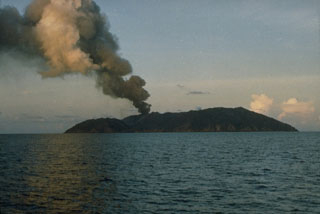Report on Barren Island (India) — 15 July-21 July 2009
Smithsonian Institution / US Geological Survey
Weekly Volcanic Activity Report, 15 July-21 July 2009
Managing Editor: Sally Sennert.
Please cite this report as:
Global Volcanism Program, 2009. Report on Barren Island (India) (Sennert, S, ed.). Weekly Volcanic Activity Report, 15 July-21 July 2009. Smithsonian Institution and US Geological Survey.
Barren Island
India
12.278°N, 93.858°E; summit elev. 354 m
All times are local (unless otherwise noted)
Based on analysis of satellite imagery, the Darwin VAAC reported that during 19-20 July an ash plume from Barren Island rose to an altitude of 1.5 km (5,000 ft) a.s.l. and drifted 45-65 km NE.
Geological Summary. Barren Island, a possession of India in the Andaman Sea about 135 km NE of Port Blair in the Andaman Islands, is the only historically active volcano along the N-S volcanic arc extending between Sumatra and Burma (Myanmar). It is the emergent summit of a volcano that rises from a depth of about 2250 m. The small, uninhabited 3-km-wide island contains a roughly 2-km-wide caldera with walls 250-350 m high. The caldera, which is open to the sea on the west, was created during a major explosive eruption in the late Pleistocene that produced pyroclastic-flow and -surge deposits. Historical eruptions have changed the morphology of the pyroclastic cone in the center of the caldera, and lava flows that fill much of the caldera floor have reached the sea along the western coast.

